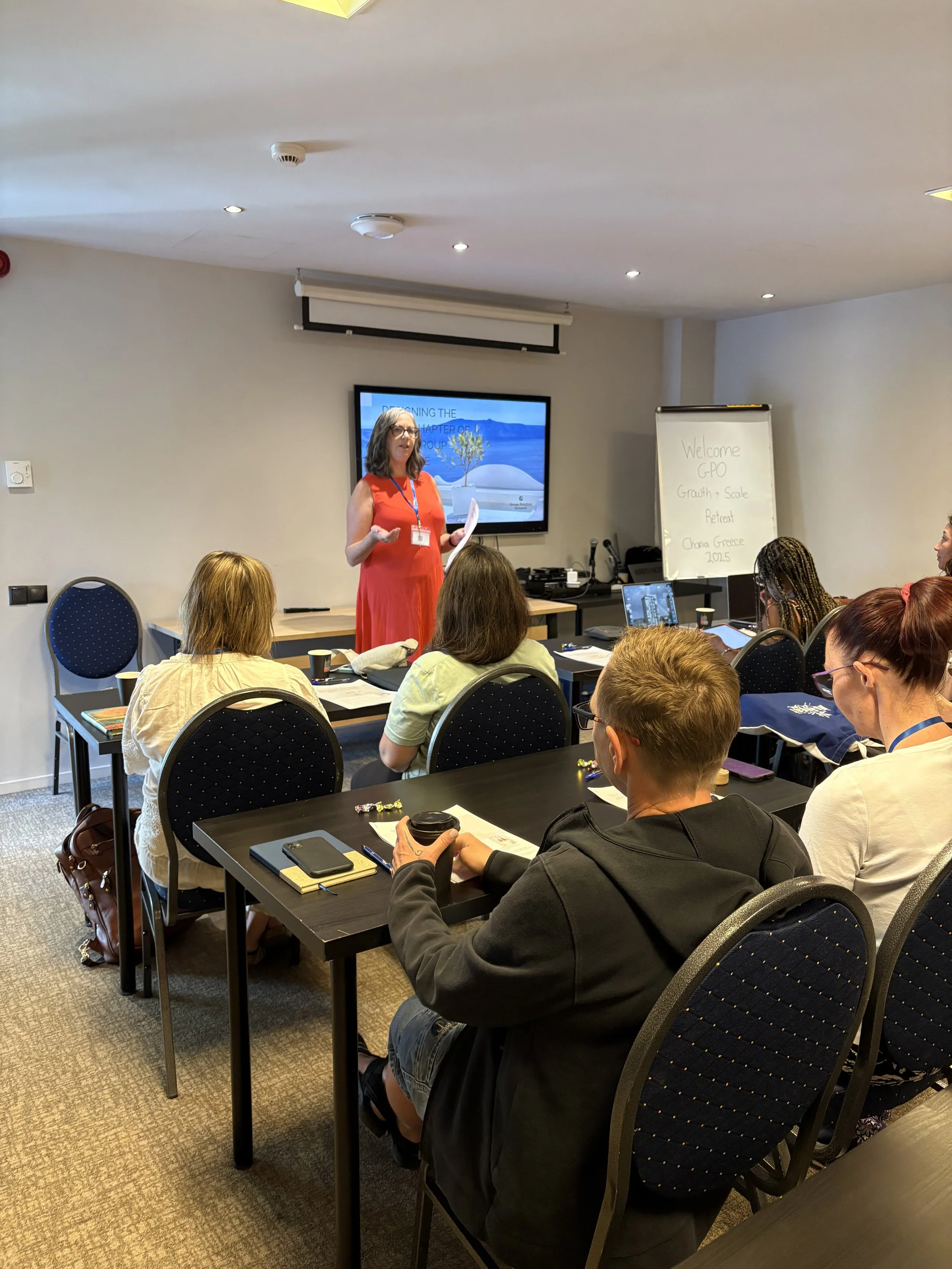Why Every Group Practice Owner Needs a Retreat (and How to Choose the Right One for You)
I have just wrapped up speaking at, and attending, a retreat for group practice owners that was hosted by Retreat Season in Chania, Greece. It was such a beautiful experience—both personally and professionally—that I wanted to take some time to reflect and share my thoughts on retreats with you.
My hope is to inspire you to consider taking a retreat soon, whether that’s with me, with another organization, or simply one you design for yourself.
Because here’s what I know for sure: retreats help us build our businesses in ways that just don’t happen in “normal” life.
The Power of Intentional Time
When I asked people about their experience of the retreat, the most common response was, “I never take this time to just think about my business in my daily life.”
And what happens when you do take that time? You get amazing ideas, inspiration, and a renewed sense of energy. You come back to your business with clarity and excitement.
As part of my opening session at the retreat, I encouraged participants to reflect on their growth as leaders over the past year, and then dream about where they want to be in 1, 3, and 5 years. It was moving to watch people pause and think about these big questions—questions we don’t normally create space for when we’re running from one task to the next.
Normally, group practice owners are juggling schedules, managing teams, handling finances, putting out fires, and caring for clients. The day-to-day pulls us in so many directions that we rarely step back and ask:
Why am I doing this?
Where do I really want to take my business?
Who am I becoming as a leader?
But when you step away for 3–5 days with the specific intention of answering those questions…imagine the breakthroughs that arise.
Listening to others share about their businesses also sparked new insights for me. When I heard what other practice owners were tracking in their metrics, I realized there were gaps in how I was measuring my own business. I left the retreat excited to revamp the way I look at my numbers, so that I can make better-informed decisions moving forward. Sometimes the best ideas don’t come from sitting alone with a blank page—they come from hearing someone else’s approach and realizing, “Oh, I could do that differently.”
Connection That Fuels You
Another gift of retreats is connection.
Even if you walk in not knowing a single person, you leave with the sense that you’re not alone. You get to spend time with people who “get it”—people who also spend their days leading teams, navigating business decisions, and holding space for clients.
One participant told me, “It’s so nice to be around people who think and talk about their business as much as I do. Nobody else in my life understands it like this group does.”
And of course, the connection often goes beyond business. At the Greece retreat, two participants realized not only were they from the same province, but they actually grew up in the same part of Canada! They spent the rest of the retreat swapping stories, sharing memories, and deepening their connection as colleagues and friends.
For me personally, one of the highlights of the Greece retreat was reconnecting with people I had first met at last year’s Costa Rica retreat and also welcoming some participants from retreats I’ve hosted here in Canada. On top of that, I got to meet others I had only interacted with in the Group Practice Connection and on Facebook—now, suddenly, we were sitting across the table sharing meals together. Those kinds of connections feel grounding and energizing, because they remind you that business friendships can be real, lasting, and supportive.
Retreats give us both: business allies and personal companions. Those relationships often outlast the retreat itself, becoming a network of support you can lean on for years.
Moving Forward With Clarity
Personally, I’ve found that retreating—whether with a group or on my own—helps me avoid shiny-object syndrome. Each summer, I take a weekend by myself at a hotel to map out where I want my business to go in the coming year.
By intentionally reviewing my goals, I can decide what’s really worth pursuing and what might be a distraction. The clarity that comes from those solo weekends has saved me from overcommitting and has helped me grow with focus and purpose.
That’s the real magic of retreating: you walk away not just refreshed, but with tangible goals and a renewed sense of direction.
Different Types of Retreats
Not all retreats look the same—and that’s a good thing! Different seasons of your business and different personalities call for different styles of retreating. Here are three to consider:
1. Adventure + Business (Like Retreat Season)
The retreat I just attended in Greece was hosted by Nicole Ripley and Chantelle Froats of Retreat Season. Their retreats combine bucket-list travel with professional growth and community. You might spend a morning in a workshop, then spend the afternoon exploring a new part of the world.
This type of retreat is often called “bleisure”—a mix of business and leisure. It’s a great fit if you love adventure, want to see new places, and thrive when your business reflection is paired with exploration and fun.
2. Small Group Deep-Dive (Like My Canadian Retreats)
The retreats I plan here in Canada are intentionally smaller, usually 8–12 participants. We gather in a beautiful spot—sometimes near nature, sometimes in a cozy venue—so it’s accessible for people across different provinces.
The focus is slower and more intentional: connection, deep conversations, and working through one or two specific areas of your business. We still have fun and incorporate some activities, but the emphasis is on space to think, clarity, and relationship-building.
This type of retreat is perfect if you’re craving deeper conversations in a smaller group setting, want to tackle a specific challenge in your business, and are mindful of travel time and costs.
3. Solo Retreats
And of course, there’s the solo retreat. This is where you take yourself away for a weekend—or even just a day—and set your own goals and pace. You might book a hotel in the city or an Airbnb in the forest. You might bring your favourite books, a journal, and a plan to map out the next quarter.
The beauty of a solo retreat is that you get to set the tone. If you’re introverted or need time to yourself to recharge, this can be incredibly nourishing.
I’ll admit, taking solo retreats hasn’t always been easy for me. As a mom, the guilt hits hard in the first few hours of being away from my family. But once I dig into the work I’ve set aside for myself, I realize that this time actually makes me a better mom and partner when I get home. The looming to-do list that used to hover over me is cleared, my goals are mapped out, and I can be more fully present with my family.
There’s also something refreshing about setting my own pace—deciding when to go to bed, or even opening my laptop the moment I wake up if I’m feeling inspired. These small freedoms remind me that tending to myself and my business ultimately benefits everyone around me.
So…When’s Your Next Retreat?
The truth is, all three of these styles of retreating bring value. None is “better” than the others—it’s simply about what you need right now.
The bigger question is: when are you carving out time to step away, reflect, and invest in yourself as the leader of your business?
Whether you choose to fly across the world, join me in Canada, or simply check into a local hotel for the weekend, I promise you: your business—and your wellbeing—will thank you.
If you’re curious about my upcoming Canadian retreats for group practice owners, I’d love to have you join us. You can learn more.
But no matter what option you choose, my encouragement is simple: book it. Put it in your calendar. Give yourself the gift of intentional time, connection, and clarity.
Because your business will always benefit from you stepping into your role as CEO—and retreats are one of the best ways to do that.



